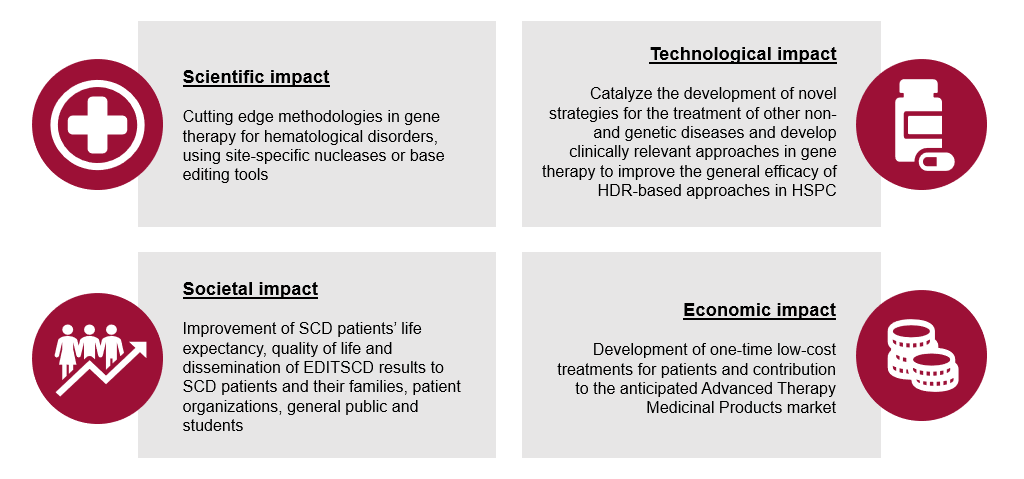
Scientific and Technological Impacts
SCD is the most common genetic disorder, with 350,000 new cases diagnosed worldwide each year. It results in severe anemia, extremely painful crises, increased risk of infections, and progressive loss of organ function. SCD affects hemoglobin, the main component of red blood cells, which carries oxygen in the blood, and is caused by a mutation of the β-globin gene coding one of the key constituent proteins of hemoglobin. The only curative treatments for SCD to date are the transplantation of blood hematopoietic stem cells from a healthy donor (an approach limited by the lack of compatible donors, i.e. less than 30% of cases only), and still experimental, lentivirus-based gene transfer approaches. Other available treatments reduce symptoms and pain but do not target the cause of the disease.
Consortium members are developing cutting edge methodologies in gene therapy for hematological disorders, using site-specific nucleases or base editors. EDITSCD will benefit from this expertise, as innovative CRISPR-Cas9-based approaches will be used specifically for SCD to reactivate the expression of fetal hemoglobin (naturally produced before birth) to compensate for the deficit of functional adult hemoglobin, or to correct the SCD-causing mutation.
The results of this project are also expected to catalyze the development of novel strategies for the treatment of other genetic and non-genetic disorders and to have a general, positive impact on the development of the health technology and biotechnology community at large in Europe. In fact, EDITSCD Consortium is developing clinically relevant approaches in gene therapy to improve the general efficacy of HDR-based approaches in HSPC and to assess safety of genome editing approaches for genetic diseases other than SCD and other non-genetic diseases amenable to genome editing treatments
Economic and societal impacts
The ultimate goal of the project is to improve SCD patients’ life expectancy and quality of life. Furthermore, developing one-time low-cost treatments for patients affected by diseases amenable to genome editing will have major benefits for the society. Better tools and standards that improve efficacy and safety in genome editing will contribute to the anticipated Advanced Therapy Medicinal Products (ATMP) global market.
Finally, dissemination of the results achieved by this consortium to SCD patients and their families, patient organizations, general public and high school students will make them aware of the scientific, health and social challenges and benefits of genome editing strategies for SCD.


